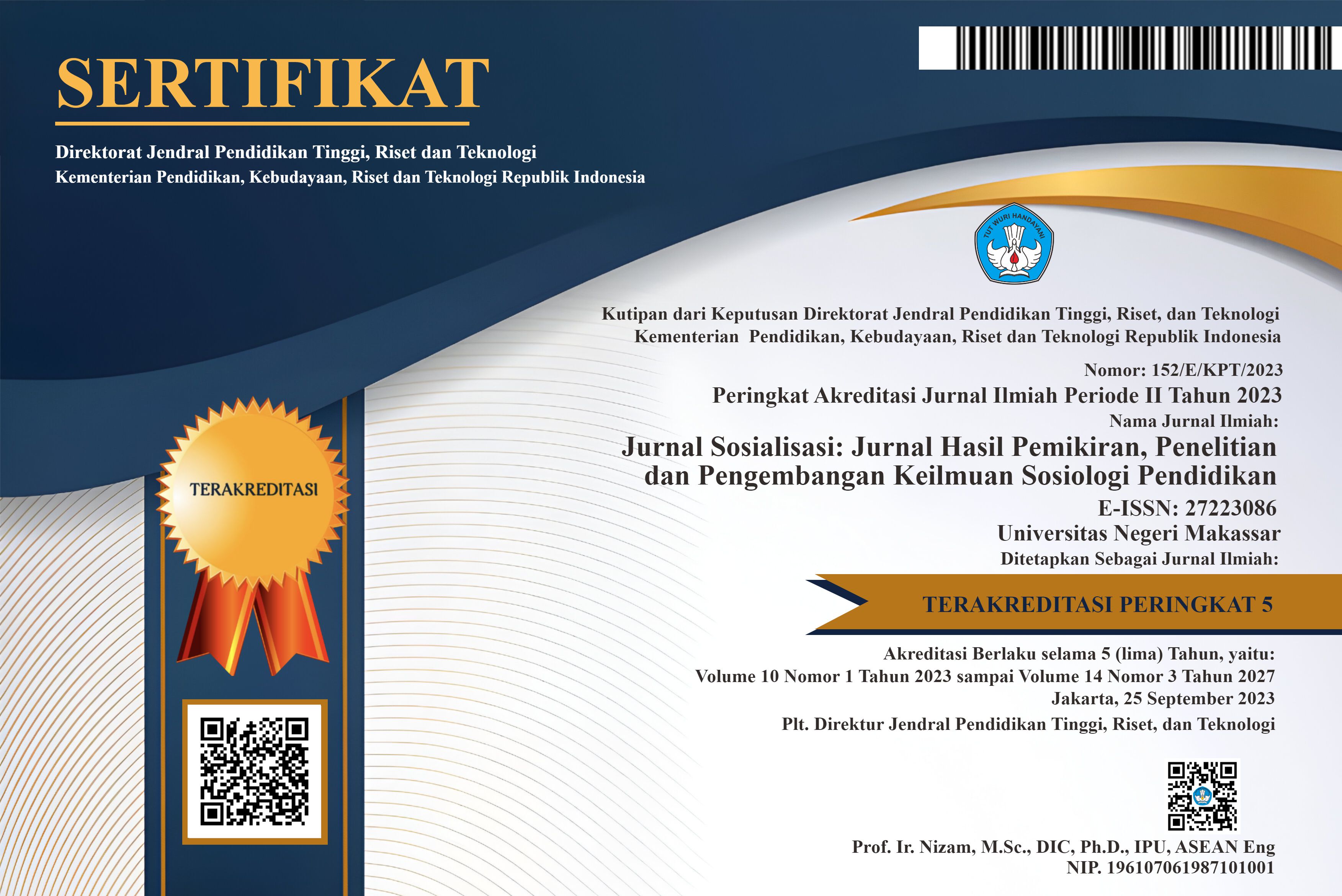“Repentance And Forgiveness”: The Place Of Political Fanaticism In Nigeria’s Democratic Woes
(1) University of Ibadan Achievers University, Owo
(*) Corresponding Author
DOI: https://doi.org/10.26858/sosialisasi.v1i1.22115
Abstract
The social qua social space known as Nigeria has been plagued by political maladministration, socio-economic misguide and behavioural nonchalance. In the light of the above, political office holders are more often than not fingered as both the cradle and the grave of this copious generational dilema. It is however unfortunate that the sheer inability to see this problem from a wholesome perspective- with emphasis on the electorate, has infused a fate-like sense of powerlessness in the general public. Although tons of theoretical and empirical studies exist on the issue at hand, there is a sense in which this particular study inputs the blame of Nigeria’s underdevelopment on the electorate- a shift from both academic and professional norma. The paper theorizes using Tajfel’s social identity that group identification has occasioned political fanaticism and this in turn engenders multifaceted underdevelopment. The paper further recommends as a way of conclusion, the need for a thorough consociational system of governance in the Nigeria’s political space. This will help in wholesomeness to alleviate the fear of domination by the majority ethnic groups among other solutions.
Keywords
Full Text:
PDFReferences
Abdulwaheed, A., Adebiyi, O. M., & Bakare, A. R. (2018). Ethnicity and election outcomes in Nigeria: interrogating the 2015 presidential election. JournaL of African ELEctions, 17(1), 117–139.
Achebe, C. (1984). The trouble with Nigeria. Heinemann.
Adekola, A. A., & Olumide, O. O. (2019). Election gifting and the ordeal of democracy in Nigeria. European Scientific Journal, 15(5), 119.
Agbor, U. J. (n.d.). Religion As A Determinant of Voter Behavior: An Analysis of The Relation Between Religious Inclination And Voting Pattern In Cross River State, Nigeria.
Akinkuotu, E. (2018). With 87m poor citizens, Nigeria overtakes India as world‟ s poverty capital. The Punch.
Akinkuotu, E. 2018. “Presidency Blames Jonathan for Delay in Forming Buhari’s Cabinet.” Punch. Retrieved from https://punchng.com/presidency-blames-jonathan-for-delay-in-forming-buharis-cabinet/
Andeweg, R. B. (2000). Consociational democracy. Annual Review of Political Science, 3(1), 509–536.
Beyers, J. (2015). Religion as political instrument: The case of Japan and South Africa. Journal for the Study of Religion, 28(1), 142–164.
Bogaards, M., Helms, L., & Lijphart, A. (2019). The Importance of Consociationalism for Twenty‐First Century Politics and Political Science. Swiss Political Science Review, 25(4), 341–356.
Chabal, P., & Daloz, J.-P. (1999). Africa works. Disorder as Political Instrument.
Chuks, O. U., & Glory, O. E. (2019). Ethno-religious hate speeches and political violence in Nigeria’s fourth republic. Вестник Российского Университета Дружбы Народов. Серия: Государственное и Муниципальное Управление, 6(2).
Collier, P. (2011). Wars, guns and votes: Democracy in dangerous places. Random House.
Dauda, M., Adamu, A., & Ahmodu-Tijani, L. (2019). Vote Trading in Nigeria Politics. Asian People Journal (APJ), 2(2), 42–51.
Dudley, B. J. (1966). Federalism and the balance of political power in Nigeria. Journal of Commonwealth & Comparative Politics, 4(1), 16–29.
Ellemers, N., Spears, R., & Doosje, B. (2002). Self and social identity. Annual Review of Psychology, 53(1), 161–186.
Elochukwu, A. (n.d.). A GLANCE AT ETHNICITY IN NIGERIAN POLITICS.
Greene, S. (2004). Social identity theory and party identification. Social Science Quarterly, 85(1), 136–153.
Ishiyama, J. T. (2011). Comparative politics: principles of democracy and democratization (Vol. 8). John Wiley & Sons.
Joseph, E. (2020). The Impacts of Political Corruption on Democratic Consolidation and the Electoral Process in Nigeria. Academicus International Scientific Journal, 11(21), 38–45.
Köker, P. (2020). Why dictators veto: legislation, legitimation and control in Kazakhstan and Russia. Democratization, 27(2), 204–223.
Lemarchand, R. (2007). Consociationalism and power sharing in Africa: Rwanda, Burundi, and the Democratic Republic of the Congo. African Affairs, 106(422), 1–20.
Lijphart, A. (1996). The puzzle of Indian democracy: A consociational interpretation. American Political Science Review, 90(2), 258–268.
Nwankwo, C. F. (2019). Religion and Voter Choice Homogeneity in the Nigerian Presidential Elections of the Fourth Republic. Statistics, Politics and Policy, 10(1), 1–25.
Obono, O. (2003). Cultural diversity and population policy in Nigeria. Population and Development Review, 29(1), 103–111.
OCHOGA, A. O. (n.d.). Election and Electioneering Process in Nigeria: The 2015 Presidential Election in Focus.
Odisu, T. A. (2015). Corruption and insecurity in Nigeria: a comparative analysis of civilian and military regimes. Basic Research Journal of Social and Political Science, 3(1), 8–15.
Olukoshi, A. (2004). Changing patterns of politics in Africa. Cadernos de Estudos Africanos, 5/6, 15–38.
Omobowale, A. O. (2008). Clientelism and social structure: an analysis of patronage in Yoruba social thought. Africa Spectrum, 203–224.
Oriola, T., & Adeyanju, C. (2009). Haunted: the symbolism of the noose. African Identities, 7(1), 89–103.
Osoba, S. O. (1996). Corruption in Nigeria: historical perspectives. Review of African Political Economy, 23(69), 371–386.
Scott, S. (2018). A sociology of nothing: Understanding the unmarked. Sociology, 52(1), 3–19.
Sirotkina, E., & Zavadskaya, M. (2020). When the party’s over: political blame attribution under an electoral authoritarian regime. Post-Soviet Affairs, 36(1), 37–60.
Tajfel, H. (1957). Value and the perceptual judgment of magnitude. Psychological Review, 64(3), 192.
Tajfel, H., Billig, M. G., Bundy, R. P., & Flament, C. (1971). Social categorization and intergroup behaviour. European Journal of Social Psychology, 1(2), 149–178.
Thaut Vinson, L., & Rudloff, P. (2021). Ethnicities and Conflict: A Survey Experiment on the Effect of Narrative Framing on Perceptions in Jos, Nigeria. Ethnopolitics, 1–22.
Ugbede, L. (2018). Restructuring: APC Committee Recommends State Police, Resource Control, Fiscal Federalism. Premium Times.
Ugbede, L. 2018. “Jonathan to Buhari: You can’t Blame me for your Failures.” Premium Times. Retrieved from https://www.premiumtimesng.com/news/top-news/301679-jonathan-to-buhari-you-cant-blame-me-for-your-failures.html
UNUMEN, J. O. (2019). Strong Institutions and the Challenge of Democratic Consolidation in Nigeria’s Fourth Republic. Canadian Social Science, 15(1), 29–35.
Walter, I. and O. L. Omoregie. 2017. Democracy in Nigeria: Problems, Challenges and Consolidation. Ekpoma: Ambrose Alli University Press
Worldometers. 2020. Nigeria Population. Retrieved from https://www.worldometers.info/world-population/nigeria-population/
Article Metrics
Abstract view : 187 times | PDF view : 53 timesRefbacks
- There are currently no refbacks.

This work is licensed under a Creative Commons Attribution 4.0 International License.


































